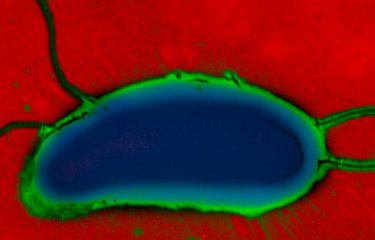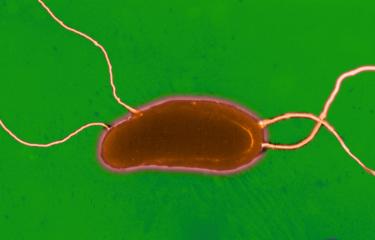In response to the risk of epidemics in the regions affected by the disaster, the Institut Pasteur, which is engaged in the battle against infectious diseases on a daily basis, has mobilized. The expert in charge of the Institut Pasteur Emergency Cell for Biological intervention (CIBU) is currently on a mission in Sri Lanka to participate in evaluating the risk of epidemics in this region. At the same time, the Institut Pasteur recently sent quick diagnostic tests for cholera and bacillary dysentery, which were produced urgently, to epidemiologists from the organization Epicentre. The Cell for Epidemic Alert and Response (CARE) is also prepared to send experts and technicians to assist the World Health Organization (WHO) if necessary.
Press release
Paris, january 11, 2005
The Risk of Epidemic
Merging populations, a lack of hygiene and difficulties accessing potable water resulting from the catastrophe that occurred on December 26th are all grounds for fear of epidemics. Although this risk is currently considered moderate, vigilance is essential and the quick establishment of a specialized monitoring system is indispensable. Experts fear that sources of diseases such as cholera or other diarrheal diseases will appear. Respiratory infections could also develop. There is also fear of the emergence of virus that are not usually in contact with people and that would require special expertise.
Institut Pasteur, which specializes in infectious diseases, is therefore involved in the microbiological monitoring being conducted in the region, and is prepared to take action if epidemic sources appear.
Institut Pasteur Experts in the Field
The Institut Pasteur Emergency Cell for Biological intervention (CIBU) has joined an initiative led by the French Ministry of Health to provide disaster assistance. This mission, which left for Sri Lanka on January 2nd, also involves organizations such as Institut de Veille Sanitaire, Véolia Environnement, Sanofi-Aventis and Action contre la Faim. The primary objective is to evaluate the potential risk of epidemics and to organize effective support in case an epidemic event occurs. Institut Pasteur is currently contacting local health authorities and NGOs on site in order to offer immediate assistance in terms of microbiological analyses and identification of circulating pathogens.
The Institut Pasteur Cell for Epidemic Alert and Response (CARE), responsible for coordinating quick support for on-site operations, has also offered its assistance to the WHO. Biology experts and technicians who are part of the International Institut Pasteur Network may go to the catastrophe area, and specifically to Indonesia and Sri Lanka, if necessary. On-site epidemiologists are also prepared to go to the region in cooperation with Epicentre Doctors Without Borders/Médecins Sans Frontières (MSF) in order to help coordinate preventative and diagnostic operations if epidemic sources arise.
cooperation with Epicentre Doctors Without Borders/Médecins Sans Frontières (MSF) in order to help coordinate preventative and diagnostic operations if epidemic sources arise.
Quick diagnostic tests for cholera and Shigella flexneri dysentery, produced urgently at the Institut Pasteur in Paris, have been provided to Epicentre epidemiologists for use in the field. The Institut Pasteur in Madagascar has also begun production of 5,000 cholera tests, which will be sent to the WHO’s "Global Task Force for Cholera" for distribution if needed in the afflicted regions.
These quick diagnostic tests for cholera, in the form of small strips, were developed at the Institut Pasteur in Paris and Madagascar. They are easy to transport and simple to use: the user simply dips the strip into a stool sample and waits 2 to 15 minutes for the result. Without this test, traditional diagnostics would require samples to be transported to an analysis laboratory, which could take several days from isolated regions, then two to three days would still be necessary to obtain results in the laboratory. The strip tests could also make it possible to considerably improve cholera monitoring in the most remote regions. For further information, see our press release of September 9, 2003.
On the same basis, quick diagnostic tests for Shigella flexneri dysentry - developed within International Institut Pasteur Network at Bangui, Madagascar, Ho Chi Minh Ville, Bucarest, Paris - were first evaluated in Vietnam. Other test are in development : first is a multivalent one dedicated to the detection of the whole shigella species, others are for the diagnostic of the main agents responsible for dysentries, Shigella dysenteriae, Entamoeba histolytica (amibiases) and E. coli O157 (bloody diarrhea).
The Search for Vaccines against Cholera and Shigellosis More Pertinent than Ever
The tsunami catastrophe sheds dramatic light on the threat of infectious diseases and the importance of the research aiming to prevent them.
A candidate vaccine against shigellosis (bacillary dysentery), which is currently being clinically tested in humans, was developed at the Institut Pasteur. This disease rages in tropical regions in particular, where it is rampant, with epidemic peaks in certain seasons or in times of humanitarian disasters such as wars and in refugee camps. According to estimations, shigellosis kills between 600,000 and 1 million people each year throughout the world, and essentially children under the age of five.
As for cholera, it is present in many countries, and more particularly in the Bay of Bengal, which is the birthplace of cholera, in the form of epidemic outbreaks. Each year it also afflicts hundreds of thousands of people, with a 25 to 50% mortality rate when left untreated. Institut Pasteur has successfully tested a candidate vaccine in animals against this blight, which should also go through clinical tests in humans in the future. The only vaccine currently available offers good protection, but only for the first six months. Although it is recommended in high-risk situations (refugees, residents of shanty towns), it cannot be used in national vaccination programs. According to the WHO, there is an urgent need for a vaccine that offers reliable, long-term protection both in adults and in children. The candidate vaccine from the Institut Pasteur may meet this objective.
Institut Pasteur operates thanks to the generosity of the public, as 30% of its budget comes from donations and legacies. Support our initiatives to help in Southeast Asia:
Contact press
Institut Pasteur Press Office
Nadine Peyrolo
01 45 68 81 47 - npeyrolo@pasteur.fr
The Institut Pasteur is a private, non-profit foundation dedicated to biomedical research, public health, and education. Nearly 2,600 people work at its Paris campus, where a large part of the research focuses on infectious diseases. Throughout the world, 29 Instituts Pasteur are spread out across five continents, bringing together 9,500 people.




